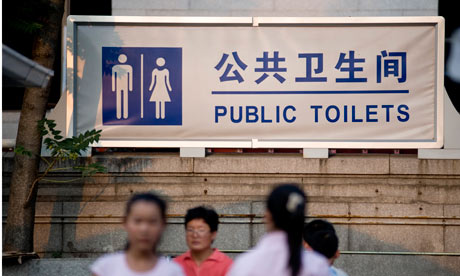
There is a line inside. Women lean against a curving wall, only a few feet away from half a dozen women squatting in the stalls opposite, over squat latrines placed above a channel of trickling water. There isn't a door in sight ... The women in the queue smile at me. They gesture. You go first! No, please! Possibly it is courtesy. Probably it is curiosity. Let's see how the lo wei (foreigner) does it!"
"How does the lo wei do it? With my head down, the fastest expulsion of liquid possible, and by building doors in my mind."
That's Rose George, peeing in front of strangers in a ni-hao ("hello")-style toilet in rural China. This unflinching, somewhat surreal account is typical of her book The Big Necessity: Adventures in the World of Human Waste (Portobello Books, London). In it, she travels around the globe, talking shit with people and bringing to life the inequalities of a world in which two-fifths of people live without a toilet and 2.6 billion without adequate sanitation.
George is a compelling guide – you believe her because she's been there. Candid and funny, one minute she's merrily slopping through London's sewers in crotch-high waders, next, she's pitting Nasa's $23m space toilet against its Russian counterpart. The chapters, like scenes in a tightly scripted film, show you snapshots of situations from which you can draw your own conclusions.
In an Ivory Coast restaurant, she is ushered to a tiled but empty single-roomed building. This, it transpires, is the toilet: "'Do it on the floor. What do you expect? This isn't America!'" the waiter exclaims.
In Tokyo, to explore the ubiquitous "high-function toilets" (which, at the very least, have heated seats and built-in bidets), she tells a hairdresser's receptionist about her project: "I tell him I'm writing a book about toilets. 'Why?' I say Japan's toilets are like no other. 'Are they?' [He thinks] 'Westerners don't like them.' [He makes a gesture of spray going upward] 'They don't understand.'"
Her relaxed style, reporting conversations, thoughts and adventures clearly and openly, gives you the chance to curl your toes and cross your legs along with George. She eschews the obvious toilet humour for a sharp, witty tone of voice – showing you can be funny about pretty much any subject without belittling the serious aspects.
But this book is more than one woman's reflections during a worldwide tour of sanitation. Personal experience is combined with plenty of well-referenced information. Stark statistics on the state of sewage sit alongside historical accounts of the likes of John Snow and Thomas Crapper. She's picked the right people to talk to and the right places to visit. The result? Writing that presents a satisfying mix of ideas on sanitation, including cultural, historical, political and religious aspects.
When lists of the most popular science articles are bursting with dinosaurs, particle physics, space science, genetics (and, of course, sex), this great book is all the better for being built around a deeply unsexy theme. Sometimes gross but always engrossing, this writing succeeds because George has found a subject that is relevant to all of us – even if many of us like to pretend it isn't.
Chrissie Giles (@christinagiles) is senior science writer at the Wellcome Trust and editor of the magazines Wellcome News and Big Picture
Enter the Wellcome Trust Science Writing Prize in association with the Guardian and the Observer

